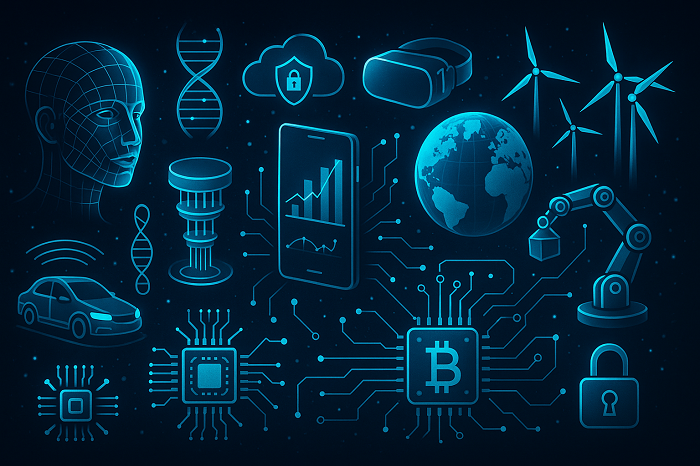Technology continues to evolve at an astonishing pace, transforming the way we live, work, and interact with the world. As we step into 2025, innovation is no longer just about convenience, it is about creating intelligent, sustainable, and connected ecosystems that shape the future. From artificial intelligence redefining industries to immersive realities blurring the line between physical and digital, the coming years will be marked by groundbreaking trends that will impact businesses, governments, and everyday lives. In this article, we will explore the top 10 tech trends shaping the future in 2025, providing you with a complete guide to what lies ahead.
1. Artificial Intelligence at the Core of Everything
Artificial intelligence is no longer a futuristic concept, it has become the foundation of almost every digital application. In 2025, AI is being integrated deeply into healthcare, finance, education, and manufacturing. Generative AI tools are making content creation faster and smarter, while predictive analytics is helping businesses make better decisions. AI-powered assistants are becoming more intuitive, bridging the gap between humans and machines with natural conversations and personalized recommendations. What makes AI a defining trend for 2025 is not just automation, but its ability to collaborate with humans to improve productivity, creativity, and innovation.
2. Quantum Computing on the Horizon
Quantum computing, once confined to laboratories, is gradually moving closer to real-world applications. By 2025, leading tech companies are racing to build practical quantum computers capable of solving problems that traditional computers cannot handle. From drug discovery to climate modeling and financial simulations, quantum computing holds the power to transform industries that depend on complex calculations. Although it is still in its early stages, the progress being made in quantum hardware and algorithms makes it one of the most promising trends to watch.
3. The Rise of Extended Reality
Extended reality, which includes virtual reality, augmented reality, and mixed reality, is shaping the way people interact with digital environments. In 2025, XR is expanding beyond gaming and entertainment to revolutionize training, education, retail, and remote collaboration. Businesses are using immersive environments to onboard employees, conduct simulations, and create more engaging customer experiences. The metaverse, although still evolving, is becoming a virtual layer of the internet where people can socialize, work, and transact, making XR one of the most disruptive technologies of the decade.
4. 5G and the Path to 6G
The rollout of 5G networks has already transformed mobile connectivity, but in 2025, the technology is reaching maturity with faster speeds, lower latency, and expanded coverage. This enhanced connectivity is enabling real-time communication for autonomous vehicles, smart cities, and IoT devices. At the same time, researchers are already working on 6G, which promises to deliver speeds up to 100 times faster than 5G by the end of the decade. The shift to ultra-fast networks will open the door to innovations such as holographic communication and hyperconnected infrastructure.
5. Sustainable Tech and Green Innovation
Sustainability is no longer optional, it is a necessity. In 2025, green technology is a major driving force, with innovations focusing on reducing carbon footprints, improving renewable energy adoption, and creating eco-friendly solutions. Smart grids, energy-efficient data centers, and sustainable product designs are becoming mainstream. Companies are investing heavily in circular economy models, ensuring that technology development goes hand in hand with environmental responsibility. With climate change being a global priority, sustainable technology is set to shape the future in profound ways.
6. Cybersecurity Reinvented with Zero Trust
As digital ecosystems expand, cybersecurity threats are growing more complex. In 2025, organizations are embracing zero trust architecture, a model that assumes no user or device is trustworthy by default. With the rise of remote work, IoT devices, and cloud computing, this approach is essential for securing sensitive data. AI-driven cybersecurity tools are also becoming critical in detecting and mitigating threats in real time. Cybersecurity in 2025 is not just about building firewalls, it is about creating adaptive and proactive defense systems that protect individuals and enterprises alike.
7. The Expansion of Internet of Things (IoT)
By 2025, IoT is becoming an inseparable part of everyday life. From smart homes to connected healthcare devices and industrial automation, IoT is making the world more efficient and interconnected. Advances in sensor technology and edge computing allow devices to process data locally, reducing delays and improving responsiveness. Businesses are using IoT to monitor supply chains, predict equipment failures, and enhance customer experiences. As billions of devices come online, IoT is shaping a future where everything is seamlessly connected.
8. Biotechnology and Human Augmentation
The intersection of technology and biology is giving rise to groundbreaking innovations in biotechnology and human augmentation. In 2025, advancements in gene editing, wearable health tech, and brain-computer interfaces are revolutionizing healthcare. Personalized medicine powered by AI is making treatments more accurate, while biotech is helping develop new materials, sustainable food production, and even solutions to aging-related challenges. Human augmentation, from smart prosthetics to cognitive enhancement, is pushing the boundaries of what it means to be human.
9. Autonomous Systems and Robotics
Autonomous technology is moving from experimentation to large-scale adoption in 2025. Self-driving cars, delivery drones, and robotic assistants are becoming more reliable and widely accepted. In industries like logistics, agriculture, and manufacturing, autonomous systems are improving efficiency and reducing costs. Robotics, supported by AI, is becoming more adaptive, performing complex tasks that once required human expertise. This trend is not only reshaping industries but also redefining the nature of human labor and collaboration with machines.
10. Blockchain Beyond Cryptocurrency
While blockchain gained popularity as the foundation of cryptocurrencies, in 2025 it is finding broader applications across industries. Supply chain management, digital identity verification, secure voting systems, and decentralized finance are just a few areas where blockchain is making an impact. Its ability to provide transparency, security, and decentralization makes it one of the key technologies shaping the digital economy. Governments and enterprises alike are exploring blockchain-powered ecosystems that go far beyond digital currencies.
Conclusion
The year 2025 is shaping up to be one of the most transformative periods in technology. From the rise of artificial intelligence and quantum computing to the expansion of IoT and sustainable innovation, these trends are not just futuristic concepts, they are realities that are already unfolding. Businesses, policymakers, and individuals who embrace these changes will be better equipped to thrive in a world where technology is the driving force of progress. The future will belong to those who understand, adapt, and innovate within these emerging trends.
Frequently Asked Questions
Q1. What is the most important tech trend in 2025?
Answer. Artificial intelligence is considered the most important trend in 2025 because it impacts almost every industry, from healthcare and education to finance and entertainment.
Q2. How will 5G and 6G change our lives?
Answer. 5G is enabling faster communication for IoT, smart cities, and autonomous vehicles, while 6G will push connectivity even further with ultra-fast speeds and advanced applications like holographic communication.
Q3. What industries will quantum computing impact the most?
Answer. Quantum computing will revolutionize industries such as pharmaceuticals, climate science, financial modeling, and logistics, where complex problem-solving is essential.
Q4. Why is sustainability important in technology?
Answer. Sustainability ensures that innovation does not come at the cost of the environment. Green technology helps reduce carbon footprints, conserve resources, and promote renewable energy.
Q5. What role does blockchain play beyond cryptocurrencies?
Answer. Blockchain is being used for supply chain transparency, identity management, secure voting, and decentralized finance, making it a key technology in building trust-driven digital systems.




